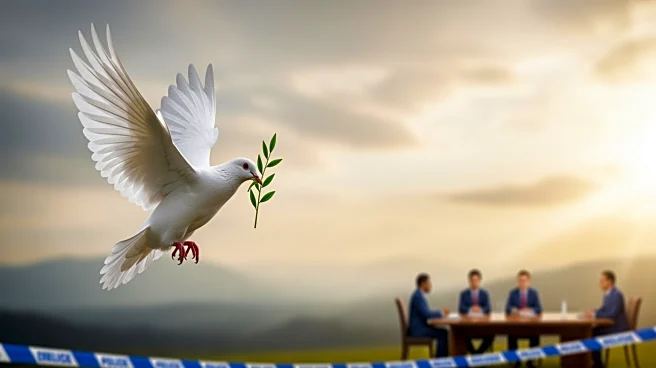What's Happening?
The remains of Staff Sergeant Itay Chen, a hostage in Gaza, have been returned to Israel for burial, marking progress under a U.S.-brokered ceasefire. Chen, a member of the 77th Battalion of the 7th Brigade, was abducted by Hamas on October 7, 2023, and
his death was confirmed on March 10, 2024. The ceasefire, initiated on October 10, aims to de-escalate the conflict between Israel and Hamas, which began with a Hamas-led attack on southern Israel. The conflict has resulted in significant casualties, with over 68,800 Palestinians reported dead according to Gaza's Health Ministry. The ceasefire has facilitated the return of hostages' remains, with Hamas returning 20 hostages to Israel, and Israel reciprocating by releasing the remains of 15 Palestinians for each Israeli hostage returned.
Why It's Important?
The return of hostage remains under the ceasefire agreement is a critical step towards resolving one of the deadliest conflicts between Israel and Hamas. This development could potentially ease tensions and pave the way for further diplomatic negotiations. The U.S. is actively involved, drafting a mandate for an international stabilization force in Gaza, which could help maintain peace and stability in the region. The humanitarian aspect is also significant, as efforts to increase aid to Gaza are underway, with the World Food Program reaching one million people with food parcels. The ceasefire and subsequent actions could impact regional politics, international relations, and humanitarian efforts, influencing stakeholders such as governments, international organizations, and civil society groups.
What's Next?
The U.S. draft for a U.N. Security Council mandate suggests the establishment of an international stabilization force in Gaza for at least two years. This proposal requires extensive negotiations among council members and international partners. Countries interested in contributing troops have indicated that U.N. backing is essential. Additionally, efforts to increase aid to Gaza continue, with calls for more border crossings to be opened to facilitate the delivery of humanitarian aid. The ongoing coordination of aid and monitoring of the ceasefire by nearly 40 countries and international organizations at a U.S.-led center in Israel highlights the global commitment to addressing the humanitarian crisis in Gaza.
Beyond the Headlines
The ethical and legal dimensions of the conflict are significant, with accusations of genocide against Israel by a U.N. commission of inquiry. The humanitarian crisis in Gaza, exacerbated by the conflict, raises questions about international responsibility and the effectiveness of global governance in conflict resolution. The long-term implications of the ceasefire and potential stabilization force could reshape regional dynamics, influence peace processes, and affect the lives of millions in the region.














